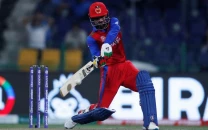3 lessons Pakistan can learn after Australia defeat
Pakistan may have lost the T20I series, but they can still hope that Babar can be the next Sarfaraz

PHOTO: AFP
The tour to Australia, which still sees Pakistan play two Test matches against the hosts, was destined for destruction from the very start.
The home series against Sri Lanka, where Misbahul Haq’s selected and trained squad, lost T20I series to the Islanders in Lahore was a clear sign that under the former skipper victory will become an unknown phenomenon for the Pakistani players.
Why Arthur was right and Misbah is wrong
Sarfaraz Ahmed was sacked as the captain from all formats due to bad individual performances after the series against Sri Lanka. Babar Azam and Azhar Ali were bestowed with captaincy in T20Is and Tests.
The Pakistan Cricket Board didn’t even blink before taking the decision and the results of their rushed decision are pretty clear.
Whenever any team visits Australia, they want to be at their prime or at least they want the best players to visit Down Under. However, the tour became an experimentation spot under the new team management.
Maybe Misbah was thinking that Pakistan had no chances of beating the resurgent Aussies, so he sent youngsters in order to prepare a good alibi for bad performances. Or maybe he thought the youngsters could pull off a miracle which no other team has ever done.
Or maybe he just didn’t care.
The thing Misbah and the new management need to understand is that Pakistan’s reign at the top of the T20I summit was not scripted in a day. Sarfaraz and former head coach Mickey Arthur had spent an ample amount of time in preparing a formidable T20I team, one which seemed invincible at one point.
What the squads? Why Pakistan will fail in Australia and Misbah will come out unhurt
However, like ODIs and Tests, Pakistan now seem to be destined for a slump in T20I rankings as well. The reasons are crystal clear. But PCB maybe doesn’t care or maybe they don’t know how to run the show.
Whatever the case, Pakistan may have a learned a few important lessons from the defeats against Australia in the two T20Is.
Firstly, captain is supposed to lead from the front in two roles, not just one. Babar is performing perfectly as an individual batsman, but his role as the captain may yet come under question. His bowling changes, his reading of the game and most importantly his eye for finding weaknesses in the opposing team’s plan and exploiting them need a lot of polishing, a skill that he will learn over time.
With the T20 World Cup fast approaching, Babar may not have enough time to hone his captaincy skills, but to hope against hope is what Pakistan cricket fans have become pretty good at.
On another note, the introduction of pacers Musa Khan and Muhammad Husnain, and batsman Khushdil Shah in the second T20I may seem like a rushed move, but to lose while giving a chance to youngsters to learn is not a complete loss at all. The experience of bowling to Aaron Finch and David Warner will help the pacers in the long run.
Meanwhile, Shah will have to wait for a few other opportunities to prove that he can be the big-hitter Pakistan have been craving for a long time now.
This is the only Pakistan playing XI that can beat Australia in 3rd T20I
Lastly, as a team, Babar and co may have learned that winning is not always possible, but losing with grace is a skill that is applauded across all sporting circles. Playing as a team, supporting each other and putting your hand up when all others fail are important characteristics of a successful team.
All in all, Pakistan may have lost the T20I series, but they should take the lessons positively and hope that Babar can be the next Sarfaraz and lead the team to consistency, if not more glory.












1726134115-0/BeFunk_-(41)1726134115-0-208x130.webp)






COMMENTS
Comments are moderated and generally will be posted if they are on-topic and not abusive.
For more information, please see our Comments FAQ